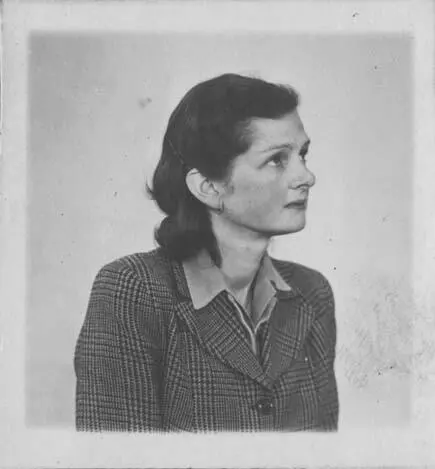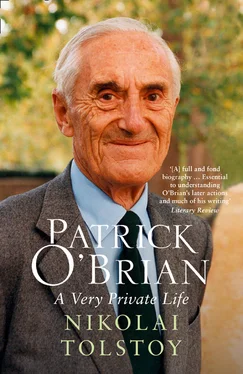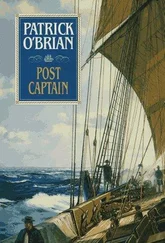In July 1949 the judge presiding over the custody hearing had ruled that Patrick ‘be at liberty to take the said child out of the jurisdiction of this Court to France for half of the Summer Holidays, the Respondent [Patrick] undertaking to return the said child within the jurisdiction at the end of the said period’.[8] Richard accordingly spent part of his 1950 summer holiday at Collioure, which he hugely enjoyed. The next term he submitted an eight-page essay ‘on the most exicting part of the holidays’, with an account of a bullfight in the little arena beside the Collioure railway station. A healthy and active boy, he revelled in swimming from the plage St Vincent, exploring the neighbouring countryside, and walking with his father and stepmother in the Pyrenees. Nor was life lonely, as it had been to such an exacting extent in North Wales. Patrick and my mother had made close friends in the town since their arrival. Among their friends, Richard saw much of Odette and François Bernardi, as also the voluble and amusing painter Willy Mucha, and his attractive and equally garrulous (when permitted) wife Rolande.
That autumn Richard fastened on the career he wanted, writing eagerly to his father:
I am very happy at school. Please could you arrange for me to go into the Royal Navy, please? Please could you arrange for me to go into the Submarine Service? Could you write to the Admilaltary now, and find out what exams I must pass so I can be in at the age of 16. I am very keen for this to happen.
Patrick, whose own lack of formal education had prevented his gaining entrance to the Royal Naval College at Dartmouth, responded with enthusiasm. No career for his son could please him more, and Richard threw himself into the project with mingled energy and apprehension:
At school we are going to have the exams, which are horrors, on Thursday. The masters make it sound so easy and pleasant but I am dreading the results and the terrible report. Thank you so much about the Navy but I am afraid of the exams. I know that it is right for me to go into the R.N., and I will work very hard for it.
Patrick himself had never passed (quite likely never sat) a single examination during his drastically curtailed schooldays, and remained throughout his life markedly sympathetic toward children encountering problems with their school work. As it happened, on this occasion Richard’s results were good, and he evinced particular aptitude for geometry. A plea to have virtually all his clothes replaced (‘All the boys at school are well dressed and I am about the shabbiest one there’) immediately elicited a cheque for the substantial sum of £10/5/-, with a pair of goggles for swimming thoughtfully thrown in for good measure. His enthusiasm for mechanical toys also pleased Patrick, who loved dismantling and reassembling clocks and other intricate machinery.
Father and son further shared a common delight in the natural world. In March 1951 Patrick sent Richard a copy of Henry Williamson’s Tarka the Otter , and the boy was already looking forward to his next holiday in Collioure:
When I come over I shall bring the Union Jack tent, air-pistol, flute and one or two books, and (if I can get one) a little pet snake, the pet shop in lower Sloane Street may have a few young vipers.
Thank you so very for Tarka and the electrical book … Can one tame young hoopoos? I would like one. Do we often have sharks in the bay as Daddy told me he saw one?
In March 1951, Richard’s mother, with whom my mother regularly exchanged correspondence concerning Richard’s needs, wrote to report that her son was unhappy at home, and enquired whether he might be allowed to live permanently with them at Collioure.[fn10] Poor Elizabeth had been ill for much of the winter, and was finding it an increasing strain combining her arduous work with looking after the lively boy in her little upstairs flat. My mother replied that they would be delighted to have him. However, Patrick, as always concerned for his son’s best interest, asked their old wartime friend Walter Greenway to take Richard out to tea, and discover how matters really stood. In due course my mother noted: ‘Walter wrote that Richard seems very happy & settled at Cardinal Vaughan’s school & he himself says he would not like to leave it & come here altogether.’
It turned out that Richard, who frequently struggled to keep up with school work, tended to grow restless and unhappy as the term drew to its close. At the same time, he looked forward to coming over ‘for the summer hols’.
My mother undoubtedly loved Richard as though he were her own son, and her affection can only have been accentuated by an unhappy exchange of correspondence in the early summer of 1951. In view of her desertion, and continued ‘living in sin’ with Patrick until their marriage in 1945, a court had granted my father custody of my sister Natasha and myself. He himself had remarried in 1943, and as a promising barrister with a substantial private income was in a position to provide a suitable home for us.

My mother in the early 1950s
I was to be sixteen in June 1951, and in April my mother wrote to the London solicitor who had handled her divorce proceedings, ‘to ask if in fact Nikolai can choose to know me if he likes after his 16th birthday’. After some delay the solicitor confirmed that there was no reason why she should not at least enquire. Accordingly, she wrote both to her parents, who remained in close contact with my sister and me, and also directly to me. I received the letter at Wellington College, accompanied by a birthday present of a handsome book: William Sanderson, A Compleat History of the Lives and Reigns of Mary Queen of Scotland, And of Her Son and Successor, James The Sixth, King of Scotland (London, 1656). My mother must somehow have learned of my devotion to the House of Stuart, following my enraptured introduction to Scott’s Waverley novels by the enlightened headmaster of my preparatory school.
Needless to say, I was delighted with the present, but bemused to know how to respond. Before I could do so, however, my father arrived at the College in a state of grim agitation. He was at pains to impress on me how appallingly my mother had behaved, not the least of her crimes being an insidious attempt to make contact with me by entering Richard for Wellington. He accordingly urged me not to reply. When I enquired what I should do with her present, he smiled and suggested I keep it. Although I felt instinctively that there was something not quite right about this, I complied, and still have the book.
Children tend to be remarkably adaptable to circumstances. I myself was generally unhappy at home. Probably as a consequence of the loss of his own mother at the age of three, followed by terrifying childhood experiences during and after the Russian Revolution, and finally my mother’s desertion, my poor father had become a solitary, parsimonious, and generally morose figure, while my Russian stepmother was a relentless scold, who made no secret of the fact that she resented my presence in the house. Although set in a delightful situation beside the Thames at Wraysbury near Windsor, our home appeared to me a gloomy prison visited by few: so much so, that each holiday I compiled a calendar, whose function was to record and strike out on a half-daily basis the approach of the longed-for return to my friends at school. Yet, despite this dismal condition, I accepted all that my father urged on me, and remained persuaded throughout my schooldays that my mother was a very wicked woman. Shortly after the episode described above, she received letters from my father and her mother, impressing on her the undesirability of approaching me when I was already experiencing emotional problems at home and school. It is not hard to picture her anguish. Fortunately, she had Patrick to sustain her. ‘Dear P.’, as she wrote appreciatively that night in her diary.
Читать дальше













